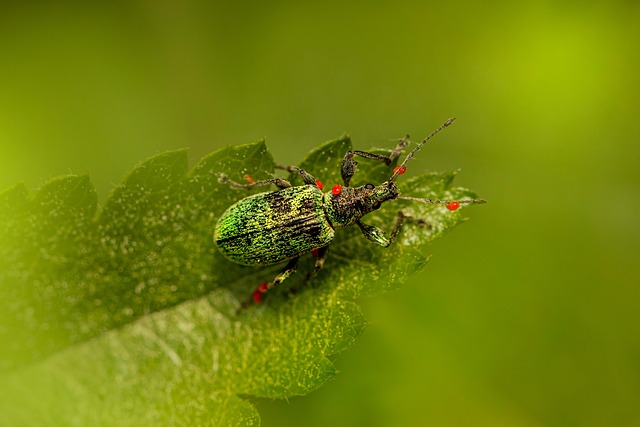Pest problems require swift action due to their rapid escalation in homes and businesses. Understanding common pests like termites, rodents, and ants, along with their behaviors, is key for prevention. Essential pest prevention tips include regular inspections, maintaining cleanliness, securing food waste, trimming vegetation, sealing entry points, and using natural repellents. Many opt for non-toxic solutions to protect families and the environment. Proactive measures reduce chemical reliance, while professional intervention is crucial for severe or persistent pest issues. Regular inspections and advanced treatments offer long-term protection, emphasizing the importance of expert advice for effective pest prevention tips.
Looking for effective yet safe pest removal solutions? This comprehensive guide offers invaluable insights into tackling common home and business pests without harmful chemicals. Discover non-toxic methods, explore proven pest prevention strategies, and learn when professional intervention is crucial. Whether you’re aiming to maintain a pest-free environment or simply seeking eco-friendly alternatives, these expert tips will empower you to take control with confidence. Elevate your pest prevention game with actionable advice tailored for both residential and commercial spaces.
Understanding Common Home and Business Pests
Pests can quickly transform from a minor inconvenience to a significant problem for both homes and businesses. Understanding common pests and their behaviors is the first step in effective pest prevention tips. Termites, for instance, are silent destroyers that feed on wood structures, often going unnoticed until visible damage appears. Rodents like mice and rats seek warm, protected places to build nests and store food, making attics and basements prime targets. Ants form colonies that can rapidly multiply, with worker ants exploring every nook and cranny in search of food sources.
Regular inspections are crucial pest prevention tips for identifying these issues early. Identifying where pests are entering your property is key to sealing off points of access. Maintaining a clean environment, especially removing food waste promptly, discourages many common pests. Simple habits like keeping garbage bins secure and storing items in airtight containers can go a long way in deterring rodents and insects. Regularly trimming vegetation and clearing debris from around buildings helps reduce pest habitats and makes it more difficult for them to gain entry.
Non-Toxic Pest Removal Solutions
When it comes to pest removal, many people automatically reach for toxic chemicals, but there’s a growing trend towards non-toxic solutions that are safe for both your family and the environment. These methods not only reduce exposure to harmful substances but also offer effective pest prevention tips. Natural repellents like essential oils (e.g., citronella, peppermint) can deter pests without leaving behind toxic residue. Planting herbs and flowers known to repel insects around your home or business is another eco-friendly pest prevention tip that can create a natural barrier.
By adopting non-toxic pest removal solutions, you’re not only safeguarding your health but also contributing to a greener planet. These methods often involve proactive measures such as sealing entry points, maintaining cleanliness, and using traps specifically designed for particular pests. While they might require more effort upfront, the long-term benefits include reduced reliance on chemicals, lower environmental impact, and a safer living or working space for everyone involved.
Effective Pest Prevention Strategies
Pest prevention is a proactive approach that forms the cornerstone of any effective pest control strategy. Implementing these pest prevention tips can significantly reduce the likelihood and severity of infestations in both residential and commercial settings. Regular inspections are key; identifying potential entry points, like cracks or gaps, allows for their timely sealing, blocking common pest access routes. Maintaining a clean environment is another vital pest prevention strategy. Food waste should be promptly disposed of, and areas like kitchens and dining rooms kept tidy to eliminate attractants.
Additionally, proper storage practices ensure that items are sealed in airtight containers, deterring pests from feeding or breeding. Regular cleaning routines, including the removal of clutter, create an unwelcoming environment for pests seeking shelter. Combining these pest prevention tips with professional pest control measures can lead to a more secure and bug-free space, ensuring peace of mind for homeowners and business owners alike.
Professional Pest Control Services: When to Call in the Experts
Many homeowners and business owners try to tackle pest problems on their own, but there are times when professional intervention is necessary. Recognizing the signs of an infestation and understanding when to call in the experts is crucial for effective pest prevention tips. Pests like rodents, termites, or insects can quickly escalate, causing significant damage to structures and health hazards.
Professional pest control services offer specialized knowledge and advanced tools to identify and eliminate pests safely and reliably. They provide tailored solutions, ensuring minimal environmental impact while effectively ridding properties of intruders. Regular inspections and proactive treatments are key to long-term protection, making it wise to consult professionals for persistent or severe pest issues.
In light of the above, adopting a multi-faceted approach to pest management—combining non-toxic solutions, effective prevention strategies, and professional expertise when needed—is key to maintaining safe and reliable environments for both homes and businesses. By implementing these pest prevention tips, individuals can take control of their spaces, ensuring comfort and peace of mind. Remember that proactive measures are often the best defense against pests, so stay vigilant and consult professionals when necessary to achieve lasting protection.
